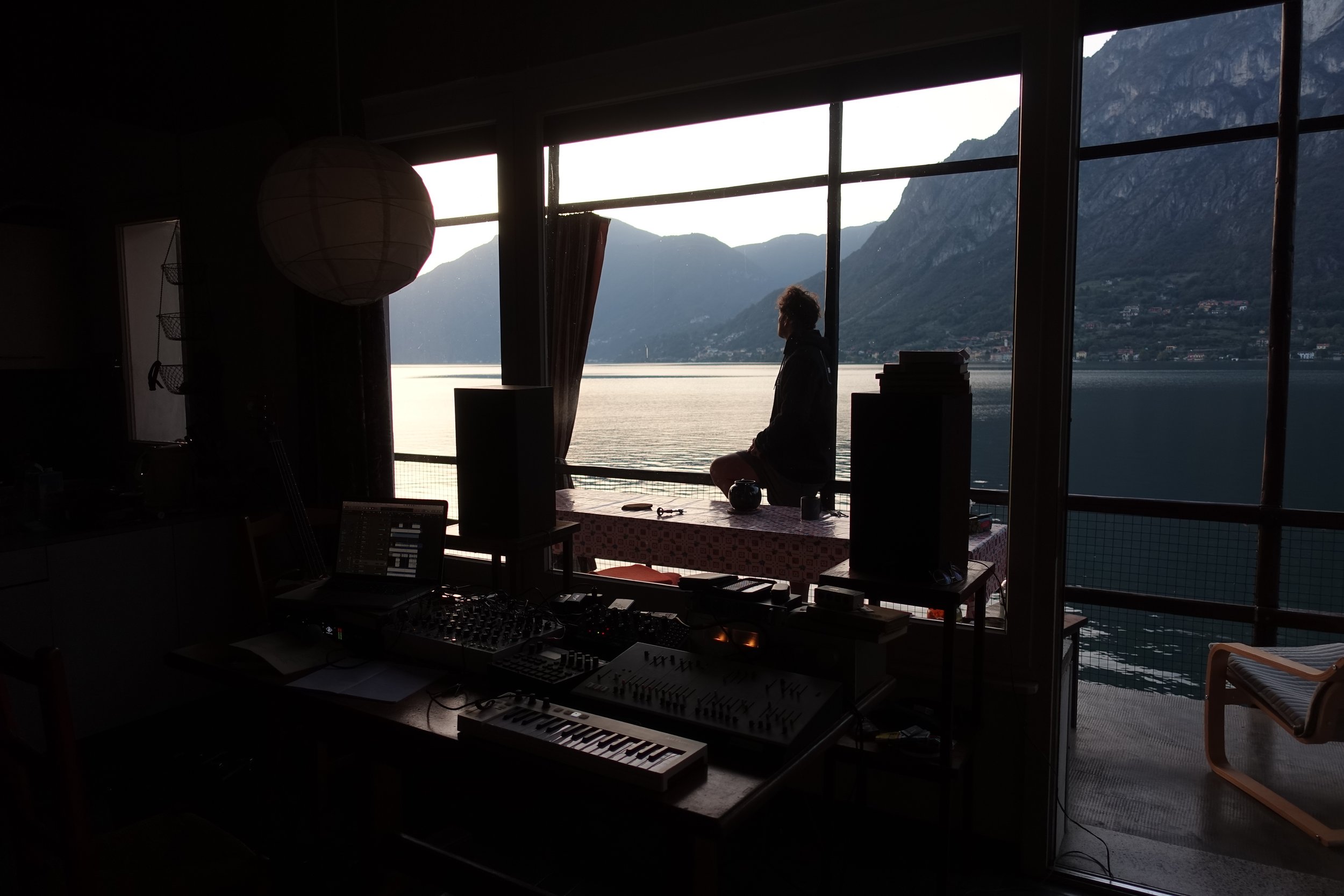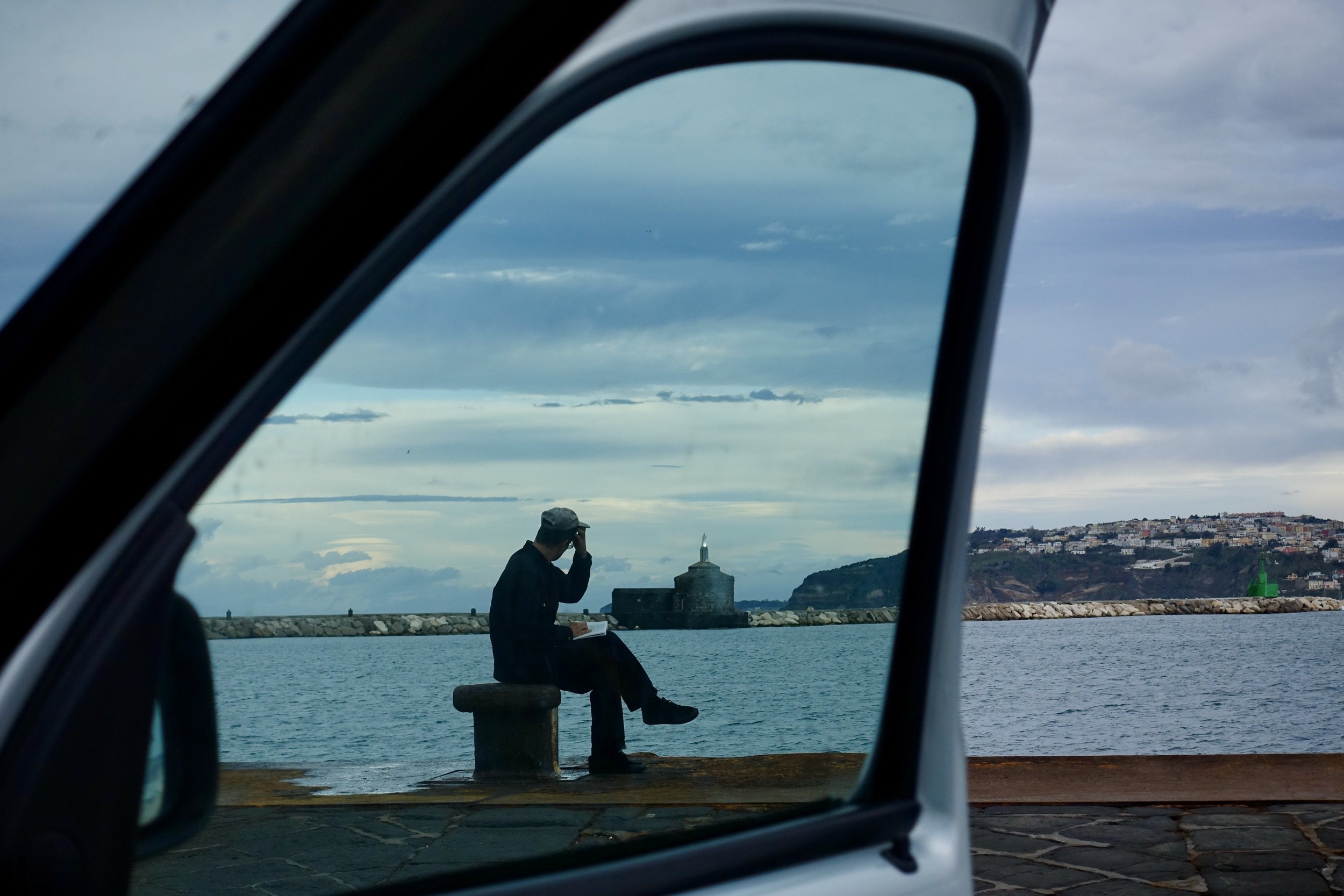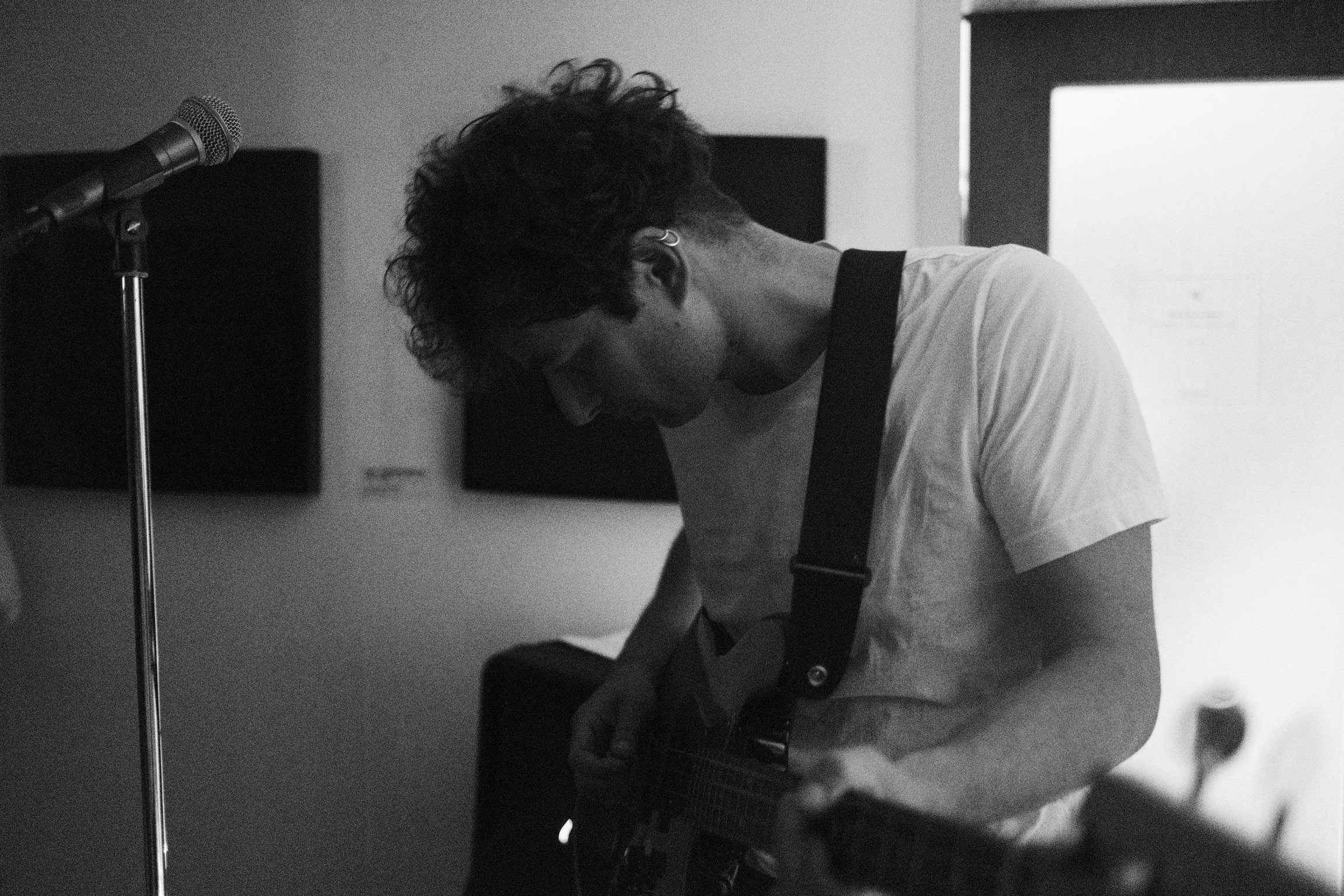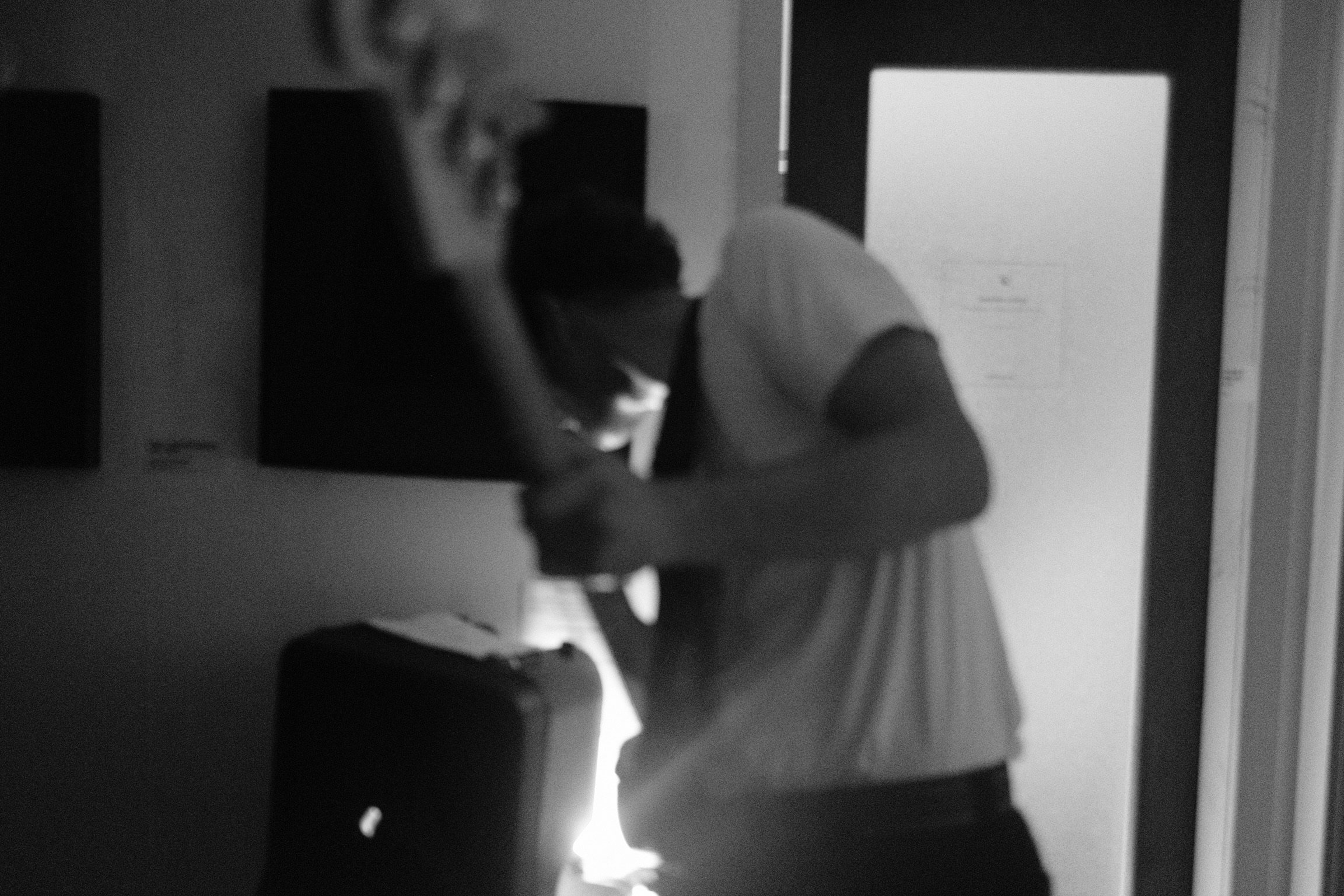A Teresa.
A chat with Infesta.
With news that reissues of once mainstream acts are now out-selling new ones, my music taste and its anachronistic properties feel all the more prescient.
Nowadays, pastiche has become as crucial an attribute as musicianship in conveying an artist’s cultural heft, but attempting to spot the influences with Infesta’s music, and the task quickly turns Sisyphean. Rather than a few clever touchstones, my ears were intrigued with every single possibility, eventually leading to my limited knowledge of “canzoni italiane”.
With soaring, yet classic sounding melodies, Infesta outlines a haunted facsimile of late 70s or early 80s italo-wave. Except that it it’s not a facsimile, but perhaps the spectre of a troubadour. There’s something arresting in Infesta songwriting, an ability to compose music that feels new, yet simultaneously like something pulled from my collective memory.
After diligent care in design by having artwork made by stick-poke tattoo artist Delicate Ruins, soon became the appropriation to the idea of connecting the dots within a story. Dee Dee’s Picks tenth edition acts as the gateway to this fascinating wordsmith’s lyrical catalogue extracted from personal journals and diaries. Injected with a dose of existentialism and dark humour to the writing process, as well as sharpened pop hooks for its musicality.
A defining time for many musicians pursuing the arts of exploring sonic palettes is the moment of learning a song, an instrument and recording it. The procedure of selection and layering of sounds. The idea of dissolving this mysticism and truly being in control of something. The realisation that there's a lot more enigma coinciding with simplicity in music that you may not have realised before and discovering new journeys from there on in. The knowledge of its technicality brought with a background in contemporary songwriting becomes a quest for sounds surrounded by layers of storytelling. To establish a sonic aesthetic that represents yourself and what you want to present to the listener.
The recording of Passerella took place at the end of the summer of 2022 over one week of isolation and songwriting in a house on the shoreside of the lake Lugano. Layered with references from a contemporary approach to 80s synth pop, post-punk and dark wave, with subconscious derivations of Canzone Italiana as a foundation for a musical piece derived from Infesta's childhood listening habits. Bare genuineness, emotional and aggressive at the right places, the way in which music captures the purity of intense feelings. Infesta’s work is presented in a raw quality which intimates the listener with an aspect of humanity grippingly relatable.
Cemented songs with a focussed vision, Infesta’s dark yet familiar world is one confused but shared among us all. The conceptuality of a traditional album dissolving into a musical diary. The music within this record is a rendering of the importance of having these songs compiled side-by-side as a way of storytelling. To keep the same picture of the exposure of a person through their music. Conflicting inner thoughts frolicking side by side. A gentle hand caresse gleaned by an author to its listener.
“Having recorded the entirety of the album by myself, I opted to co-mix it with Augustin von Arx, a good friend of mine from Geneva. We had worked together in 2021 on the mix of his first solo album, Les Jardins Omni, therefore it felt logical to continue this joint effort and ask Augustin to work on my own debut record. The idea of trust became evident, having him by my side and bringing a fresh perspective to the mix. There are challenges when transitioning from working in a band to releasing a full-length album on your own. On one hand, a major challenge is the lack of feedback, which can make you feel insecure. On the other, it allows freedom, spontaneity and quick decision-making based on intuition. I didn't have to verbalise my thoughts or explain structures. The framework was mostly outlined in my head, where I could work on it and make changes at any time during the creative process. I enjoyed the challenge of working alone and exploring new ways of creating music.
Since this is my first solo work released through Dee Dee's Picks, it also feels like the first time I'm exposing my aesthetic as a solo artist. The process of creating this album was about crystallising my changing influences and experimentation into a concrete album. In its making, my daily schedule involved swimming in the lake in the morning, then returning home to light up the fireplace and record some bass lines on my phone. From there, I added simple percussive sounds from my drum machine and focused on creating song structures based on rhythmic sequences. It’s a trick I learned from observing a friend's workflow, where it proved to be effective as it helped me overcome the issue of layering without considering the song structure. It felt like solving a puzzle, finding recordings that worked well together and piecing them into songs. I repeated this process until I had all the elements to sketch out a song. The resulting skeleton of the songs led to shorter tracks, influenced by my background and love for punk and raw music. However, it also reflected my subconscious inclination towards pop music, short and sweet, completed with catchy hooks and chord progressions. Working with Augustin in the mixing process brought a balance between his sound choices and my own while keeping the album minimal in production, allowing each element to find its place.
Another particular challenge was to settle on a name. Over the following months of writing Passerella, I collected numerous ideas and filled several pages with potential monikers. Since all the lyrics are in Italian, it felt natural for me to focus my search on names with sounds similar to the language. One of the ideas was to use the word "ferale" ("feral"), but I abandoned this option due to its meaning in Italian and my interest in linguistics. To elaborate, "ferale'' has a different meaning in Italian and English. In Italian the word signifies something closer to matters related to death rather than wilderness, as it does in its meaning derived from English. Instead, I found the name "infesta'' appealing because it carries a nice double meaning in Italian: "to haunt" and "to celebrate" or "party." Choosing this name had to do with resonance. Each name grew and faded within me, but “Infesta'' remained and served as a fitting cloak for the multitude of words and concepts contained in the album. Additionally, I chose it to avoid confusion in interpretation across languages. During my teenage years, I developed a habit of reading many books and came into contact with works of existentialist and romantic authors. Finding one's place in a modern and shiny society, reflecting on the human condition, life, and caducity were topics incepted from these authors that deeply resonate with me. It's not a facet of my personality that is immediately apparent to casual observers or those in a rush to pass judgement.
At first glance, it may even come across as pessimistic and emotionally draining. However, I am completely comfortable with this aspect of who I am. Thankfully, I have found a powerful outlet for expressing and embracing this through my music. Thus the album's title originated from brainstorming with friends after its completion. It comes from “Passerella”, a song I wrote about the feeling of walking a narrow path that defines one's direction in life, symbolising the human condition. In Italian, it also carries the double meaning of a catwalk, and since this is also my debut album, it made sense to showcase my vulnerability as a way to present myself and my inner aesthetic to the listener. It’s a self-imposed ironic take on my artistic heritage, whatever it means. So, it's like a haunted catwalk, in a way.
Having a significant background in reading has greatly influenced my songwriting, particularly in terms of storytelling. Growing up in a television-free family, I started reading at an early age, delving into the endless and stimulating world of literature. Throughout my teenage years, also inspired by the diaries I was reading, I developed a habit of writing for myself. I have notebooks filled with sketches of short stories, poems, as well as personal and emotional diary entries. It's something I've continuously done at various moments in my life.
During the process of creating this album, I felt the desire to shed some of the weight from the notes I took around 15 years ago and give them space in the present. I scrolled through the lines in these old diaries, setting apart sentences, texts and words that might be interesting elements. Using a cutting and pasting technique, I found guidelines for familiar descriptions to form storytelling. I then filled in the spaces between the fragments, wrote more verses, and brought the texts to life. This manoeuvre resulted in the lyrics, which came at the end of the songwriting process.
The exception is the closing track "Brucia i Ponti”, where I composed the words and melody on the same day in December 2022, after the initial recording session. My instinct for producing lyrics comes from the vibe of the instrument and the flow of the song, which guide me in choosing the words to fill in the narrative between the music. I also have a strong interest and attraction to the way words sound when pronounced with specific accents or inflections.
I questioned whether I could write generic lyrics, and I realised that I couldn't.This solo project is also a way to express a part of myself that may not always be visible to others, as my lyrics truly represent a side of my personality. The fact that I had an urge to incorporate this aspect into my music felt natural. It's something that accompanies me along my path, even if it's not always present in my everyday life as perceived by those who know me. It definitely belongs to me.
In my songwriting, I wanted to explore the feeling of being a spectator of my own existence and at the mercy to those processes. It's about feeling powerless in the face of certain events and the uncertainty that arises from the open questions about the human condition. Relationships, sometimes with a romantic twist, were also topics I wanted to explore. There is an element of synesthesia, I suppose, in how I chose the topics. Sometimes you hear black, other times feeling grey, succumbed by plenty of light and shadows in the words I use. I thought about this when selecting words for the colours they evoke. A metaphorical auditory association, if you will. For instance, the song "Fastidio" is derived from the poem “Canto notturno di un pastore errante dell’Asia” by Giacomo Leopardi. Leopardi, one of the major Italian poets and a key figure in literary romanticism, serves as inspiration for what is now known as cosmic pessimism. While it may be clear to those familiar with his works what I am referencing, it merges with my previously mentioned ideas of word associations.
There are indeed revolutionary undertones, most prominently in the songs "Giovani" and "Immane." However, I want to emphasise that it is not my intention to present my idea of politics as a call to arms. I'm not here to dictate how people should live or what they should do. I encourage you to think for yourself, independently and critically. I simply describe things as I interpret them, as I experience them through my own senses. With that said, "Giovani" is a generational anthem, an introspective reflection on the human condition and our transitory existence. I have a fascination and a desire for the freedom and new experiences that await the youth.
The idea of the opportunity to do good and think freely as well as to take their lives into their own hands. I wish for the next generation to possess strength, wildness, and freedom. An innate right to liberty. For me, there may not be much hope, but we can still indulge ourselves, explore the paths of arts, cultures, and sciences, as "Immane" suggests. It is about finding joy despite being constrained by the concepts of dualism that I present. This notion of being engulfed by darkness but also having the ability to find one's own light. I find that these glimpses of light shine through the power of the younger generation or the power of relationships.
The rest of the songs fall along the motifs of relationships, memory, sorrows, hopes, abandonments, uncertainties and states of unrest. However, a song that I wrote that was more distinct in presenting the celebration of friendships was “Ryan”.
Ryan was a childhood friend from high school who moved to Canada in my late teens. Although we had a strong bond during those years, sharing books and discussing philosophical theories, we completely lost touch until last summer when we finally reunited. The reunion was special because we quickly rekindled our connection as if there hadn't been a decade-long gap. The song actually combines two stories.
The first part relates to the sample used as the intro. Ryan was working for a moving company in Montréal, and he described to me the challenges that come with physical labour and minimum wage employment. In this kind of job, there are all kinds of characters involved, as it is a low-level entry position. The sample comes from a video that Ryan shared with me where he and his colleague are throwing stuff in the dump. I found it particularly intriguing to have this strong French-Canadian-accented man shouting at Ryan, saying, "Libère-toi, fâche-toi, allez soldat!" (Free yourself, get angry, come on soldier!). His work environment was vibrant and chaotic. Although the dialogue in this video is in a French-Canadian dialect, I felt it coincidentally reflected many of the lyrics and themes present within this record. It had a militaristic quality to it, with his colleague yelling these orders.
The second part of the song refers to a story that Ryan told me. While living in Montreal, Ryan started going fishing with a friend in the Saint-Lawrence River. One day, Ryan went alone to fish for catfish on the frozen river. While he was decapitating and gutting his catch, a family happened to walk by. They were so disturbed and shocked by what they saw that they left in utter dismay. It may sound gruesome, but to me, it represents that shared enthusiasm for life that I have with him, but with a primal, feral, and untamed twist. Therefore I repurposed the name of the river in Italian as San Lorenzo for creative reasons. But this is indeed an interesting way to reflect on how we don't concern ourselves with what is considered normal by others. After all, normality is defined by the individual. Who are we to set standards for others in the end?
When I showed you Astrid's draft for the album's artwork, you mentioned that it reflects my music in the sense that the points, the existential themes of self-questioning and examination, appear to touch but never quite connect. I appreciate that interpretation of my music since it actually aligns with how the artwork came to be. Astrid, who practises hand-poke tattoos under the name Delicate Ruins, expressed her interpretation of my music through her art. I came across her work online while searching for inspiration and we eventually agreed to meet up when she had some tattoo sessions taking place in Zurich. I really wanted her to be a part of this project since I wanted to delegate and have others contribute their perspectives. I'm completely intrigued by the result of her work. It's like something you can decide the meaning of, perhaps a bird's-eye view of a distant landscape from above. An outsider’s perspective. I really appreciate this open interpretation of the album cover. In the end, no pun intended, it feels like the dots did connect. We all reached a meeting point of agreement.
The pictogram for the obi, however, was entirely my idea. I wanted something that reflected me. Since Astrid didn't know me well enough to make that judgement, I drew inspiration from the last song, "Brucia i Ponti." I wanted a pictogram of a bridge. Burning bridges, a war strategy involving the destruction of bridges to hinder the enemy's pursuit and communication serves as a metaphor for what can happen in a relationship. After the breakthrough of the Italian line at Caporetto in 1917, the Italian army embarked on a long and disastrous retreat that took them across the Tagliamento River, which I mention in the song, before falling back across the Piave River. At the moment when I wrote it, it felt natural and fitting to use this strong historical reference as a parallel to the events and emotions I was experiencing and expressing through the music. I have an affinity for a cold and massive aesthetic, so I immediately liked Astrid's proposal. I also appreciated how the artwork depicted the beginning of the bridge but left the end unseen, which is metaphorically suitable for anyone's life journey. Some areas may feel solid, but the ultimate destination remains unknown. This aligns well with the themes explored throughout the album.”
Stay up to date and get in touch with Infesta.











